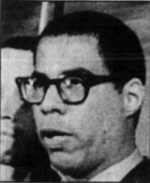 AP Photo On April 20, 1983, the wife of a military policeman received a phone call from a man, who identified himself as a fellow member of the military police, in the Criminal Investigations Division, on the Quantico Marine Corps base where her husband was stationed. The caller informed the woman that her husband had been in a serious accident and said he would come to pick her up at her off-base apartment to take her to see her husband at the hospital. The woman got into the unknown man’s car and was driven to a deserted part of the base where the man raped, choked and stabbed her in the throat, leaving her for dead. The woman survived the assault. After describing her assailant as a black man, the victim viewed a lineup of several men, reportedly identifying two who “looked like the man” who had attacked her. One of the two men identified was 27-year-old Marine Corporal Lindsey Scott. Soon after, Scott was charged with rape, sodomy, abduction and attempted murder. Scott was black and the victim was white, and the case quickly became a racially charged topic in the media. Scott’s arrest had drawn the attention of local civil rights groups who voiced concern that Scott had been prematurely singled out because of his race, since he was the only black criminal investigations officer on duty at the time of the crime. Scott was tried by a general court martial in October 1983. He had provided his civilian attorney, Ervan Kuhnke Jr., with details of his whereabouts and names of additional witnesses who had seen him on the night of the crime, but his attorney did not contact the witnesses or otherwise try to confirm his alibi. The victim confidently identified Scott as her attacker in court. The knife used in the crime was never located and the prosecution relied on circumstantial evidence to tie Scott to the crime. Scott testified for more than two hours in his own defense. He claimed that on the night of the crime, he had been cleaning an apartment that he and his wife had just moved out of, as well as shopping for a birthday gift for his wife. Military investigators testified that the victim had failed to positively identify Scott as the perpetrator in both physical and photo lineups. He was convicted on October 11, 1983 by a jury of seven Marine officers and sentenced to 30 years in prison at hard labor and dishonorable discharge from the Marine Corps. On July 6, 1987, the U.S. Court of Military Appeals overturned Scott’s conviction on the basis that his trial counsel had failed to provide a competent defense of Scott. A retrial was ordered and Scott was released from prison to return to Quantico. On January 25, 1988, a second court-martial convened for Scott’s retrial. Shortly before the trial began, Scott’s attorney read an article about DNA testing. He sought to have Scott’s blood and a sample of semen recovered from the victim sent for DNA analysis – then an extremely new procedure that was just beginning to gain acceptance in the courtroom – in an effort to determine whether Scott was the perpetrator. The government agreed to pay for the testing and the samples were sent for analysis during the trial. The semen evidence collected was a very small sample that was not sufficient in size for routine serological testing, but efforts were being made to extract the necessary DNA. In the final days of the retrial, the results came back that the semen sample was too degraded for DNA analysis. During the retrial, Scott’s attorneys sought to present testimony regarding the questionable lineup procedures, during which Scott had allegedly been identified by the victim, but the judge would not permit them to do so. Witness Cynthia Ausby testified for the defense. She was a security guard at one of the stores where Scott said he had been shopping for his wife’s birthday gift on the night of the attack. Ausby testified that she was certain Scott was at the store at the same time as the attack, providing a new confirmation of Scott’s alibi. Several character witnesses testified as to Ausby’s truthfulness and reliability. The victim had reported that the perpetrator had a metal pot in his car when he picked her up, which investigators believed was the same pot Scott was using to clean out his old apartment that evening. At the retrial, Scott’s wife testified that he would not have used a metal pot for cleaning, since they used such pots strictly for cooking. She testified that he had used a plastic bucket for his cleaning. A new witness, Scott’s neighbor Tammy Scott, testified that she had seen him the day of the crime and he had been carrying a plastic bucket. Marine Staff Sergeant Sammy Lee testified that during the original lineup, the victim had stated that she could not reliably pick out her attacker. Scott was one of the six men in the lineup. Scott was acquitted on all charges on February 19, 1988. In the months following the acquittal, there was discussion that Scott may be prosecuted in the Virginia court system for the same crimes. In May, the Attorney General of Virginia issued an opinion advising that an individual could not be prosecuted in the state court system for crimes that had already been adjudicated under military law. Scott later sued his original trial lawyer, Ervan Kuhnke Jr., for $1.5 million based on Kuhnke’s incompetence at Scott’s first court martial. The two settled the lawsuit out of court in 1990. – Meghan Barrett Cousino
|